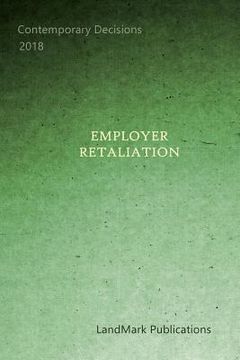Synopsis "Employer Retaliation (in English)"
THIS CASEBOOK contains a selection of U. S. Court of Appeals decisions that analyze and discuss issues surrounding workplace retaliation claims by employees. * * * Title VII of the Civil Rights Act, the ADA, and the ADEA all provide an express cause of action for aggrieved employees to bring retaliation claims in federal court. See 29 U.S.C. 626(c); 42 U.S.C. 2000e-5(f), 12203(c). Johnson v. Interstate Management Company, LLC, (DC Cir. 2017). * * * Whether brought under Title VII, the ADA, or the ADEA, retaliation claims are analyzed under the Supreme Court's decision in McDonnell Douglas Corp. v. Green, 411 U.S. 792 (1973). See Jones v. Bernanke, 557 F.3d 670, 677 (D.C. Cir. 2009) (retaliation claims under Title VII and ADEA); Smith v. District of Columbia, 430 F.3d 450, 455 (D.C. Cir. 2005) (retaliation claims under ADA); see generally Brady v. Office of Sergeant at Arms, 520 F.3d 490, 493-94 (D.C. Cir. 2008) (identifying the framework for Title VII claims). Once the employer has asserted a legitimate, non-retaliatory reason for firing an employee, the central question at the summary judgment stage becomes whether the employee has "produced sufficient evidence for a reasonable jury to find that the employer's asserted non-retaliatory reason was not the actual reason" and that the employer fired the employee as retaliation. Hernandez v. Pritzker, 741 F.3d 129, 133 (D.C. Cir. 2013); see Brady, 520 F.3d at 494. Johnson v. Interstate Management Company, LLC, ibid. * * * Before an aggrieved party can assert a Title VII claim in federal court, he is generally required to exhaust the administrative remedies provided by the statute. See Fowlkes v. Ironworkers Local 40, 790 F.3d 378, 384 (2d Cir. 2015). That is, a Title VII plaintiff generally must file a charge of discrimination with the EEOC "within three hundred days after the alleged unlawful employment practice occurred," 42 U.S.C. 2000e-5(e)(1), and must then file an action in federal court within 90 days of receiving a right-to-sue letter from the agency, id. 2000e-5(f)(1). [The district court properly rejected the argument to consider alleged acts of retaliation that were not timely presented to the EEOC after a failure to file a timely suit on the charges submitted in a previous EEOC complaint.] The district court, straightforwardly applying th[e] rules, determined that because the plaintiff had brought a federal suit within 90 days of receiving a right-to-sue letter for his 2014 EEOC complaint, but had not done so after receiving such a letter for his 2011 EEOC complaint, only conduct occurring 300 days before he filed the 2014 complaint with the agency was properly exhausted. Duplan v. City of New York, (2nd Cir. 2018).

